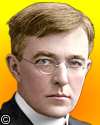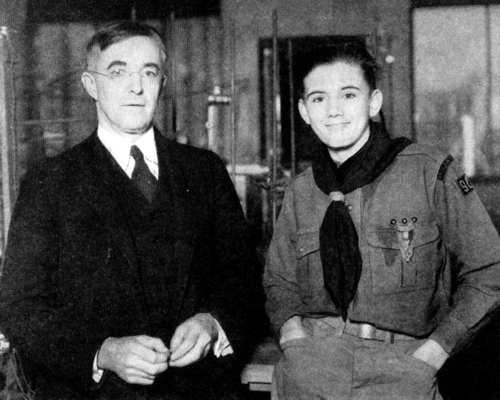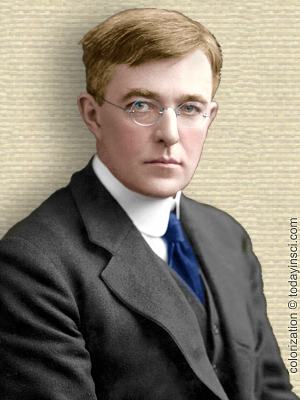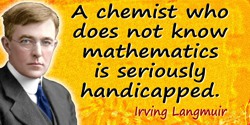 (source)
(source)
|
Irving Langmuir
(31 Jan 1881 - 16 Aug 1957)
American physical chemist who was awarded the 1932 Nobel Prize for Chemistry, famous for his investigation of reactions at thin surface films. He improved incandescent light bulbs by filling them with inert gases rather than a vacuum, and also developed atomic-hydrogen welding.
|
Dr. Irving Langmuir
Winner of the Nobel Prize in Chemistry
discusses with Irving Crump the value of Summer Jobs
From Boys' Life (Jun 1941)
[In this article, aside from its themes of summer jobs and scouting, Irving Langmuir reveals some of his boyhood experiences that contributed to his abilities as a research scientist and led to winning a Nobel Prize. Likewise, he also describes what drives his assistant, and gives him outstanding qualities. In the present, his message not only remains true, but is perhaps more urgent. Motivated students can still be recommended to seek a summer job that will challenge their intellectual development. Information students get by themselves is enormously more valuable than that which is taught to them in school. Students need opportunities—outside of school—to research, inquire, reason, get hands-on, explore, be curious and explain the phenomena around them. Students who succeed in these pursuits are the most likely to become the future research scientists and engineers. Both boys and girls: take note! —Webmaster][p.12] The remarkable career of Dr. Irving Langmuir, or at least that part of it which led directly to his recognition as one of a select group of scientists that includes Einstein, Roentgen, the two Curies, Sir J. J. Thomson, Sir Ernest Rutherford and other Nobel Prize winners, began as a summer job. When he was a teacher of chemistry in Stevens Institute an opportunity came to him to spend July and August. 1909, in the research laboratory of the General Electric Company in Schenectady, New York; a job which, planned to last only two months, has continued ever since and has resulted not only in achievement of the Nobel award for Dr. Langmuir but in the enrichment of humanity. And because the opportunity to work and learn and, eventually, to make many new discoveries in the borderland of chemistry and physics came to Dr. Langmuir as a vacation venture, few are better qualified to impress upon the readers of BOYS' LIFE the importance of securing summer time occupation of some sort.
“Every boy should try to find himself; to discover his own capabilities and his own interest as soon as possible, and there is no better time to do that than in the summer.” said Dr. Langmuir. “It is very unfortunate that boys should be graduating from high schools and colleges not knowing what they want to do and also quite unaware of what they arc prepared to do. It takes many young men quite some time to become oriented and started on their careers; the boys who devote their summer vacations discovering their own interests and abilities are just so far ahead of those who, after they are graduated, flounder from job to job until they find the work for which they are best suited. “It is only through work that boys really discover themselves, and I think every boy should have a vacation job whether it is on a farm or in a factory. When he goes back to school he will know more about himself and his interests and will have a better idea of what he would like to do in the future, and incidentally, he will have been paid for his efforts, which is also important.
“On the theory that summer is the time to make discoveries many boys are offered opportunities for vacation time employment in the plants of the General Electric Company. It has long been the practice to offer each summer a limited number of jobs to boys who are sophomores and juniors in college. There is a double purpose behind the plan. In the first place it gives the General Electric Company a chance to get acquainted with a group of young men and determine whether they have the background and interests that will carry them ahead in the company should they later be employed permanently.
“In this way the company builds up a list of possible future employees, fairly sure in the knowledge that anyone of them will be suited to a job. That is very important both to the individual and the company because it is always unfortunate when a man finds, after three or four months, that he is not suited to the work he has undertaken. It means that he has invested time and the company has invested money in something that has not worked out.
“To the young men these summer jobs give opportunities to make many discoveries about themselves; whether they like the work they are doing; whether they are comparatively fitted for it and whether they are pursuing in school lines of study to fit them for their life’s work.

"So I would certainly suggest that every boy, as soon as he is old enough to work, should try each year to secure a summer job. I know they are hard to find sometimes. There are many barriers to be hurdled. But I still believe that the average intelligent, ambitious American boy can secure one even if be has to make his own opportunity. Yes, a boy with initiative can often create his own job if he pushes hard enough. There is still plenty of opportunity for a boy to approach an employer and tell him that he wants a chance to prove himself. He will find that most employers are willing to give him a chance to demonstrate his worth to them. “I positively do not hold to the idea that seems to be influencing the thinking of many young men today. Unfortunately this idea that there are few opportunities for a young man has become fixed in the minds of too many young people. It is far from true. There are many more jobs and many more opportunities than there were two or three generations ago. Indeed, there is scarcely any field of endeavor in which a rich future does not exist. Just look at the opportunities for research in the field of aviation development alone. They are almost boundless. And these opportunities are bound to increase after the war. I am quite convinced that aviation is going to take a tremendous boost after the war and the production powers of this country are going to be stupendous. And it is up to the boys of the present generation to prepare themselves to take advantage of these opportunities intellectually and in every other way. To them I want to say:
“Train yourselves. Don't wait to be fed knowledge out of a book. Get out and seek it. Make explorations. Do your own research work. Train your hands and your mind. Become curious. Invent your own problems and solve them. You can see things going on all about you. Inquire into them. Seek out answers to your own questions. There are many phenomena going on in nature the explanation of which cannot be found in books. Find out why these phenomena take place.
“Information a boy gets by himself is enormously more valuable than that which is taught to him in school. I have in mind a young man I know: my laboratory assistant, Vincent Schaefer, who as a boy was a Lone Scout, later a Scoutmaster and now a Merit Badge Counselor. He has always [p.43] had an inquiring mind. That is why he is becoming increasingly valuable to me in the laboratory. Vincent has never been content to have questions go unanswered. Recently he discovered some rare, tube-shaped ice formations at the foot of a falls, some of the columns being nine feet high and one and a half feet in diameter. He wondered how they were formed. Such information cannot be found in textbooks so he decided to find the answer through his own exploration. He discovered that foam bubbles at the foot of the falls getting under the ice escaped through air holes in the ice and formed a heap of froth. As the bubbles came into contact with the cold air they soon froze, particularly where they were in contact with the surrounding tee. As bubbles followed one another, forced up through the same hole, they slowly formed a tube. The bubbles which were rising through the tube did not freeze since they were protected from the cold air by the froth around them, but they kept freezing at the top of the column near the edge of thc top layer of froth and so built up a column.
.jpg)
“The phenomenon is very rare even at this one place and it took keen observation and powers of deduction to discover it and its cause.
“I want to emphasize that the knowledge one acquires through this kind of research, through an inquiring mind such as Vincent Schaefer has, is the most valuable knowledge one can gain. This is not only true in studying natural phenomena but in formal education as well. It is excellent training to take a subject you have never had at school and work it out for yourself so that you can pass an entrance examination in it for college. If you do you may find that you have a better foundation and a broader knowledge of the subject than has a boy who has taken the subject in a more formal way at school. Here is a case in point. I never studied chemistry in high schoo1. After some years In French schools while my father was employed in Paris, I went for one year to Chestnut Hill Academy in Philadelphia and then to Pratt Institute, Brooklyn, where they had a four-year high school course preparatory for college. As I had been delayed about a year by having been In French schools I decided to take only three years of high school and work up by myself the subjects that I would have had in the fourth year of high school. In this way I prepared myself to pass the entrance examinations in several subjects for admission into Columbia University, particularly chemistry and mathematics, which I especially liked. I think that the knowledge and training that I gained by my own efforts was far more valuable to me than if these subjects had been fed to me by teachers in regular high school courses.
“The American schools were a great joy to me after the French schools. For one thing at Pratt they had a well-equipped manual training shop in which I learned woodworking and metal working. Trained hands are the beginning of a trained mind and I would advise boys to cultivate the ability to do things with their hands. His ability to work with his hands. His ability was one of the reasons why I selected Vincent Schaefer as my assistant, and I guess another reason was because he is so thoroughly self-trained and has such an inquiring and searching mind. I know his interest in seeking knowledge for himself was the reason why he first became associated with the General Electric Company through Dr. Willis R. Whitney, Founder of the Research Laboratory.
“As a Scout Vincent used to join Dr. Whitney and me in skiing. I have been an enthusiast since I taught myself how to use skis when I was a student In Germany in 1903. Dr. Whitney and I found this Lone Scout so stimulating and possessed of such an active interest in everything such as wildlife, archeology, Indian remains, geology and all the phenomena of nature, that he was always a welcome companion. When he was graduated from high school and found that he could not go to college because he had to work to support his family, Dr. Whitney gave him a job in the machine shop at the General Electric plant where he enrolled in the course for apprentice toolmakers.
“The ability he displayed there in training his hands and his mind made him stand out as a superior workman, and when our laboratory group had particularly intricate things to be done we found ourselves seeking out Vincent not only because he did the job well by putting all he had into it, but because he frequently made intelligent suggestions for improvements. I liked him and liked his work and when seven or eight years ago I needed an assistant I asked to have him appointed to my staff.
“Working in the research laboratory was of course new to him but he studied and took courses and he is now a well-trained and highly qualified laboratory assistant. In fact this former Lone Scout was recently awarded a key by the Junior Chamber of Commerce as the most outstanding young man in Schenectady. And I want to emphasize again that almost all his knowledge and training he has worked out by himself, and he is by so much the richer intellectually for it.
Looking back on my own school and college days, it seems to me that the things of most value were learned spontaneously through interest aroused by a good teacher, while the required work was usually comparatively uninteresting. The university student should have leisure for some independent work and opportunities for continuing his interest in hobbles of various kinds. I realize that it is difficult so to arouse the student's interest that he will spend leisure in these ways rather than on the bleachers cheering the football team in their practice games, but a well-planned effort is worth while.
“The importance of arousing even a young boy's interest in independent work can hardly be overemphasized. My real interest in science was derived from my older brother who encouraged me to have a workshop at the age of nine, and later a laboratory when I was only twelve.
“I can illustrate my father's influence in stimulating independence by the following incident: When I was twelve I climbed one or two Swiss mountains of moderate height with my brother, Arthur. Soon after he had to go to Heidelberg, leaving me with my mother and younger brother at a hotel in the Rhone Valley. I had become so enthusiastic over mountain climbing that I wished to climb everything in sight, but the dangers were such that my mother did not dare let me go alone. When my father arrived for a weekend visit from Paris, he consented to allow me to climb alone any mountain I liked if I would promise to do it in accord with the following rules: (1) I must stay on a distinct trail; (2) I must use the same trail going and returning; (3) I must make certain of returning at six o'clock by allowing as much time for [p.44] descending as for ascending. Before these rules went into effect, however, I had to prove that I could and would make such sketches, maps, and notes of the trails used for the ascent that I could always return by the same route. I thus climbed several mountains about 7000 feet high, often requiring several days of repeated effort before I could discover a route that led to the top. Perhaps it is this experience which makes me even today always wish to find my own way rather than be told.”
It will interest Scouts to know that Dr. Langmuir was early associated with the Boy Scout Movement. A copy of Lord Baden-Powell's book, “Scouting for Boys” came into Dr. Langmuir's hands early in 1910 and, recognizing the value of the Movement he organized and served as Scoutmaster of one of the first three Scout Troops in Schenectady. Deeply interested in the out-of-doors and camping he took his Troop on many a hike and overnight camp. An interesting story is told of him and his Troop. An ideal site for a Troop cabin was located up in the Rotterdam Hills. back of Schenectady, and plans were made to build a log-cabin. But first permission must needs be secured from the owner of the site. Inquiries were made in the nearest town and a farmer was found who said he owned the land. Permission to use the site was freely granted and in due time trees were cut and the cabin started. When it was nearly completed the farmer visited the scene of the Troop's activities to discover that he did not own the land the Scouts were using. The site was just over the boundary line on another farmer's land.
Considerably worried the Scoutmaster sought out the second farmer who was surprised to learn of the Troop's activities on his land. When he looked at the cabin the Scouts were building, however, he consented to allow it to remain and the boys, relieved, raised money and bought two fine thick blankets for the farmer's horses.
Dr. Langmuir still maintains a deep interest in Scouts and Scouting, and in the program of the out-of-doors. He continues to be an enthusiastic skier and skate sailer, and he still likes to climb mountains. For many years he owned and flew his own airplane.
Dr. Langmuir's researches in surface chemistry, his studies of molecular films of a thickness of about one ten-millionth of an inch, and his discoveries in this invisible film world, resulted in his becoming the first industrial chemist of this nation to receive the Nobel Prize in chemistry which the Swedish Academy of Science awarded him in 1932. Scarcely a person living today has not benefited by his achievements. His research made possible the creation of the gas-filled incandescent lamp, which now saves the American people more than a million dollars a night in the cost of illumination. He is also responsible for the development of the high-vacuum electronic tube; and the atomic hydrogen method of welding. These are a few of the reasons why Dr. Langmuir is recognized as one of the outstanding scientists of the world today. He has a rare facility for seeing beyond the horizon of already known facts.
Besides the Nobel Prize he has been awarded many other distinctions including: The Nichols Medal in 1915 and again in 1920; the Willard Gibbs Gold Medal; the Hughes Medal from the Royal Society of London; the Rumford Medal; the Perkins Medal; the Chandler Gold Medal awarded by Columbia University; the Popular Science Monthly prize In 1932 of ten thousand dollars with Gold Medal; and the Gold Medal of the Franklin Institute. The Royal Academy of Rome awarded him the Cannizaro Prize In 1925. He was elected president of the American Chemical Society in 1929, and the American Society of Mechanical Engineers awarded him the Holley Medal in 1935, the same year he was elected to membership in the Royal Society of London. He is the only American industrial scientist so honored in that society, which limits its foreign membership to fifty persons.
Many colleges and universities have conferred on him honorary degrees and he was made honorary chancellor of Union College in 1934. He has published one hundred and fifty-seven papers and has been granted a multitude of patents.
- Science Quotes by Irving Langmuir.
- 31 Jan - short biography, births, deaths and events on date of Langmuir's birth.
- Cathedrals of Science: The Personalities and Rivalries That Made Modern Chemistry, by Patrick Coffey. - book suggestion.
- The Quintessence of Irving Langmuir, by Albert Rosenfeld. - book suggestion.
- Booklist for Irving Langmuir.







